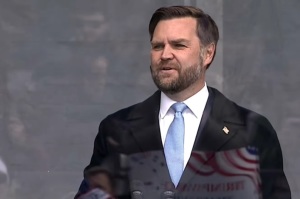Separation of Church and State? Really?
Without exception, every government and form of the state in every part of the world derives its existence and standing from God! The apostle Paul is exceedingly clear in Romans 13: 1—“The authorities [read ‘governments universally’] that exist have been established by God.”
How ironical, then, is the claim, especially in the democracies of the world, that so much work should be put into seeking a separation of the church and state! Is it “One nation under God” for the citizens of the United States of America or must we reinterpret the prohibition clause in the USA’s Constitution, as some have falsely and carelessly done, to mean that this nation must separate church and state?
All governments of all nations have their power and authority under divine appointment from above, not even by divine permission. As Robert Haldane (in his classical Romans Commentary around A.D. 1816) asserted in his comments on Romans 13, “…it is God in his providence who confers powers on every man who holds it. No tyrant ever seized power until God gave it to him.” In that sense, then, all rulers are “God’s servants” or his “ministers.”
But also mark this well: God is never saddled or handicapped by an empire of tyrants, or of those who downright oppose him and reject his sovereignty. If and when God chooses to overthrow an evil regime, he is never at a loss for alternatives to take their places. After God has used the wicked to overthrow the wicked, he will do as he wishes in accordance often with what the populace of that nation deserves. What a sober reminder this is to a nation like ours that has been so blessed by God in our two-plus century history.
All of this is straightforward biblical teaching. But where confusion has abounded in recent years in this country is in the alleged area of “the separation of church and state.”
Our founding fathers gave no grounds for the false division that has been introduced by our activistic courts and judges under the banner of “separation of church and state!” No such concept is found in our nation’s Constitution or in our Bill of Rights—not even something close to such an idea!
Instead, the founders only wanted to make sure that America did not provide for the establishment of a nationally favored state religion such as was known from the United Kingdom or parts of Scandinavia. They only argued that Congress shall make no laws providing for the establishment of a national religion. This is known as the establishment clause, but it has been yanked from its context and transformed as a claim for a “state-sanctioned atheism.”
Well, what did the founders believe? Ask George Washington, our first president. He warned: It is impossible to account for the creation of the universe without the agency of a Supreme Being, and it is impossible to govern the universe without the aid of a Supreme Being.
No less sure was John Adams, the second president of these United States: Statesmen may plan and speculate for liberty, but it is Religion and Morality alone which can establish the Principles upon which Freedom can securely stand.
John Quincy Adams, our sixth president, said: The highest glory of the American Revolution was this: it connected one indissoluble bond, the principles of civil government with the principles of Christianity.
But despite citations like these, which can be multiplied one after another, many flee to the First Amendment and pretend that there is a “WALL of separation between the church and the state erected there. But the First Amendment does not mention a “wall;” nor does it make any mention of the “church” or the “state!” Instead, it says, “Congress shall make no law respecting an establishment of religion, or prohibiting the free exercise thereof….”
Where did this “wall of separation” come from, then?
It came from Thomas Jefferson’s private letter to the Danbury, Connecticut Baptists, who feared the newly formed government would swallow up their freedom to worship. Jefferson wrote back to the Baptist Association on January 1, 1802 that there was no need to fear the government, for a “wall of separation between the church and the state had been erected.” Jefferson’s words had nothing to do with the Constitution, written in 1787 when Jefferson was actually out of the country. Neither did it have anything to do with the Bill of Rights passed in 1789, when he was also out of the country. Jefferson’s language actually came from Roger Williams, the man who settled the Baptist Church in Rhode Island. Williams was anxious to protect the Church from Federal intrusion, rather than worrying about the Church intruding on the Federal Government. In this very same letter, Jefferson ends by requesting prayer for himself as he promises to pray for them—an odd way to conclude if the point was to ensure a God-free state!!
Today, some have taken this metaphor and turned it around, mainly against Christians, to limit believers’ influence on government and to keep their concepts out of public life. Why do some fight so vehemently to keep every reference to God out of our Pledge of Allegiance and to keep any and all references to God out of all public life? Usually these are the very ones who contest so strongly for everyone else’s freedom—except for the God-fearing citizens! But this is not what our founders had intended, nor is it what God has intended his men and women should be, as light and salt in this world.
Believers refuse to be intimidated by such baseless rhetoric and by some alleged “wall” that hopes to insulate and isolate us from taking our Lord into the public square. But we will participate in the public forum with a freedom of conscience that comes from a Christian and biblical point of view.
Accordingly, if we are forced ultimately one day to choose if we will obey men or God (Acts 4: 19), we must do as Peter and John of old did: obey God. We will act as the Chief Justice of the United States Supreme Court advised: “The metaphor of a wall of separation is bad history and worse law. It has made a positive chaos out of court rulings. It should be explicitly abandoned!”
Rise up, O men and women of God. It’s time we called our fellow citizens to a full accountability of the historical, legislative and theological facts that impact the real life of each government. This nation, like all nations, desperately needs the input of the presence of God, the power of his Word, and the involvement of unintimidated believing citizens who will act with conscience before a holy God and with benevolence towards our fellow human beings.
[Editor's Note: This article appeared in the Fall 2004 edition of Contact magazine, a publication of Gordon-Conwell Theological Seminary. It is reprinted with permission from the seminary.]
________________________________________________________________________________
WALTER C. KAISER, JR., Ph.D., President and Colman M. Mockler Distinguished Professor of Old Testament, is an internationally known scholar and preacher. He has authored more than thirty books, including "Toward an Old Testament Theology", "A History of Israel", "Revive Us Again", "An Introduction to Biblical Hermeneutics", "The Old Testament Documents: Are They Reliable and Relevant?" and "Preaching and Teaching From the Old Testament". He served as National President of the Evangelical Theological Society, and for 25 years served on the faculty at Trinity Evangelical Divinity School (Deerfield, IL), where he was also Chairman of the Old Testament Department, Academic Dean, and Sr. Vice President of Distance Education. His ecclesial standing is with the Evangelical Free Church in America.



























